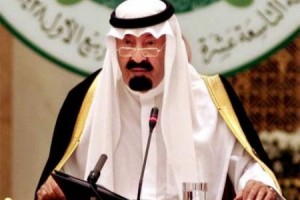 Saudi King Abdullah announced on Friday billions of dollars in handouts for his people and boosted his security apparatus in a renewed effort to shield the world’s top oil exporter from unrest rocking the Arab world.
Saudi King Abdullah announced on Friday billions of dollars in handouts for his people and boosted his security apparatus in a renewed effort to shield the world’s top oil exporter from unrest rocking the Arab world.
In a rare televised address to the nation, the aging king made a brief statement congratulating Saudis for their loyalty and national unity before a battery of decrees were read out suggesting he was embracing increasingly conservative policies.
Amongst a wave of new spending, the decrees outlined a boost in welfare benefits, bonuses for public sector workers, including the army, and a massive drive to build new housing.
In addition, the king ordered the creation of 60,000 security jobs within the interior ministry, promised more money for the religious police and, in a sign Saudi’s ruling Sunni elite will tolerate no dissent, said the media must respect clerics.
Saudi Arabia has mostly avoided the protests seen elsewhere in the region, but dissent has nonetheless built up and some demonstrations have taken place — especially in the east where many Shi’ite Muslims live.
Riyadh sent 1,000 troops to neighbouring Bahrain this week to help contain pro-democracy protests led by majority Shi’ites that the Sunni monarchy on the island broke up by force.
King Abdullah last month announced an economic package worth an estimated $37 billion in an initial move to ease social tensions. Friday’s measures are significantly more costly, with plans for a building spree set to cost $66.7 billion alone.
With more than $400 billion in foreign reserves, Saudi Arabia is in a more comfortable position than many neighbours to alleviate social pressures such as high youth unemployment.
But it was not clear if financial measures and boosting the security apparatus will silence critics within the kingdom.
Reformers have been hoping for a move towards democracy such as new elections to municipal councils, or even elections to the Shura Council — an advisory body of appointees.
The kingdom has been slow to carry out reform promises in the conservative state since Abdullah came to power in 2005. Diplomats say the king faces opposition to political openings from some senior princes and clerics.

Leave a Reply
You must be logged in to post a comment.